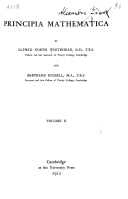Solution to Russel's Paradox
An analysis of the paradoxes to be avoided shows that they all result from a kind of vicious circle. The vicious circles in question arise from supposing that a collection of objects may contain members which can only be defined by means of the collection as a whole. Thus, for example, the collection of propositions will be supposed to contain a proposition stating that “all propositions are either true or false.” It would seem, however, that such a statement could not be legitimate unless “all propositions” referred to some already definite collection, which it cannot do if new propositions are created by statements about “all propositions.” We shall, therefore, have to say that statements about “all propositions” are meaningless.… The principle which enables us to avoid illegitimate totalities may be stated as follows: “Whatever involves all of a collection must not be one of the collection”; or, conversely: “If, provided a certain collection had a total, it would have members only definable in terms of that total, then the said collection has no total.” We shall call this the “vicious-circle principle,” because it enables us to avoid the vicious circles involved in the assumption of illegitimate totalities.
Notes:
The paradox that a set of sets that do not contain themselves must contain itself.
Taxonomies:
/food and drink/food/fruits and vegetables (0.298538)
/food and drink/food/grains and pasta (0.280408)
/business and industrial/chemicals industry/cleaning agents (0.185606)
Keywords:
vicious circles (0.938107 (neutral:0.000000)), illegitimate totalities (0.891560 (neutral:0.000000)), new propositions (0.793499 (neutral:0.000000)), collection (0.750755 (neutral:0.000000)), Paradox The paradox (0.740886 (negative:-0.585480)), vicious circle (0.739804 (negative:-0.373368)), vicious-circle principle (0.665556 (neutral:0.000000)), definite collection (0.651447 (neutral:0.000000)), certain collection (0.628682 (neutral:0.000000)), members (0.503631 (neutral:0.000000)), statements (0.501800 (neutral:0.000000)), Russel (0.482583 (negative:-0.585480)), paradoxes (0.473878 (negative:-0.373368)), Solution (0.464051 (negative:-0.585480)), set (0.463792 (negative:-0.585480)), sets (0.463734 (negative:-0.585480)), assumption (0.462140 (neutral:0.000000)), kind (0.462125 (negative:-0.373368)), example (0.459583 (neutral:0.000000)), question (0.458777 (neutral:0.000000)), analysis (0.458740 (negative:-0.373368)), shows (0.458553 (negative:-0.373368)), means (0.458337 (neutral:0.000000)), false. (0.456686 (neutral:0.000000)), objects (0.456426 (neutral:0.000000)), statement (0.456392 (neutral:0.000000)), propositions. (0.455538 (neutral:0.000000))
Entities:
Russel:Person (0.786242 (negative:-0.585480))
Concepts:
Statements (0.912104): dbpedia
Set theory (0.884960): dbpedia | freebase | opencyc
Proposition (0.850946): dbpedia | freebase | opencyc
Statement (0.825525): dbpedia | freebase
Question (0.793170): dbpedia | freebase
Philosophy of mathematics (0.691095): dbpedia | freebase | yago
Philosophy of language (0.687945): dbpedia | freebase | opencyc
Bertrand Russell (0.687741): dbpedia | freebase | opencyc | yago






